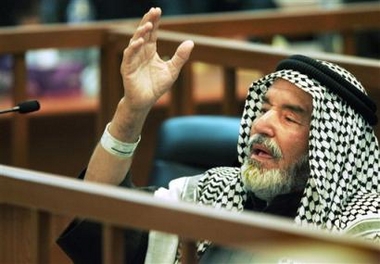|
Three of Saddam's co-defendants testify
(AP)
Updated: 2006-03-13 08:55
Saddam Hussein's trial entered a new phase Sunday as three of his
co-defendants testified for the first time, denying they had any role in the
killings and arrests of Shiite Muslims in the 1980s.

Abdullah Kazim
Ruwayyid, a former Baath Party official in the Dujail region, speaks
during his trial in Baghdad, Iraq, Sunday, March 12, 2006. Saddam Hussein
and seven co-defendants including Ruwayyid are on trial for torture,
illegal arrests and the killing of nearly 150 people from Dujail after a
1982 assassination attempt on Saddam in the town.
[AP] |
All eight defendants are to be brought
before the court, one by one, for direct questioning. The ousted leader was
expected to go last, possibly Monday, though it was up to chief judge Raouf
Abdel-Rahman to decide when to call him.
Saddam and the other defendants have spoken up often during the five-month
trial, casting doubt on witness testimony or making speeches, but those were
isolated outbursts.
The direct questioning by the judge and prosecutors will give the court the
chance to try to draw Saddam out on the crux of the trial: How much he knew of
and directed the crackdown in the Shiite town of Dujail, launched in the wake of
a 1982 assassination attempt against him.
Saddam and seven former members of his regime are on trial for the deaths of
148 Shiites in the crackdown, as well as the illegal imprisonment and torture of
Dujail residents. They face possible execution by hanging if convicted.
In the last session, on March 1, Saddam stood and boldly confessed that he
sent the 148 Shiites to trial before his Revolutionary Court, which eventually
sentenced them to death. But he insisted it was his right to do so, since they
were suspected of trying to kill him.
The prosecution has argued the Revolutionary Court trial was "imaginary" and
the defendants didn't even appear before the court. They say the crackdown was
punitive against Dujail's civilian population, with entire families 锟斤拷 including
children 锟斤拷 arrested, and men and women tortured in Saddam's prisons.
On Sunday, three men who were local Dujail officials in Saddam's ruling Baath
party stood before the chief judge and testified. Saddam and the other
defendants did not appear during the four-hour session.
Mizhar Abdullah Ruwayyid, his father Abdullah Ruwayyid and Ali Dayih Ali were
accused of being informants and directing the feared Mukharbat intelligence
agency to Dujail residents, some of whom were later killed.
Mizhar Ruwayyid appeared nervous, swearing to God he was innocent, while his
father joked with the judge, occasionally bringing a smile to Abdel-Rahman's
face.
"I have never detained people. I cannot even harm an insect," the elder
Ruwayyid said. "I will say the truth even it takes me to the gallows."
"God willing there will be no gallows," Abdel-Rahman responded.
Abdullah Ruwayyid admitted to being a member of the Baath Party but said he
was demoted in its ranks. "Although I was in the party for a long time I
suffered a lot. Hardly a month passed with me getting punished or a warning," he
said.
The judge pressed the younger Ruwayyid about handwritten letters proseuctors
presented, allegedly from him informing to police on Dujail families in the wake
of the shooting.
Mizhar Ruwayyid denied the letters were his. "The state and the security
services did not need the help of a small employee like me," he insisted. He
said he worked in the Dujail telephone office and held only a low rank in the
Baath Party.
Ali, the second to testify, said he was in Baghdad the day of the shooting
attempt against Saddam's motorcade, though he returned to Dujail later in the
day.
"My foot did not step into any house in Dujail. We did not harm the people of
Dujail and we did not write reports about them," he insisted.
Abdel-Rahman asked Ali about his signed affidavit to investigators that
stated one co-defendant Barzan Ibrahim 锟斤拷 Saddam's half brother and head of the
Mukhabarat at the time 锟斤拷 led the Dujail crackdown while another, Taha Yassin
Ramadan, was in charge of razing Dujail farmland.
Ali replied that he had only heard the two men were involved, not seen them,
and said he had not read the affidavit before signing it. "My eyes started
hurting after reading three lines," he said.
The proceedings were adjourned until Monday, when the court will start to
hear the remaining defendants: Saddam, Ibrahim, Ramadan, former Revolutionary
Court chief Awad Hamed al-Bandar and another lower-level Baath official Mohammed
Azawi Ali.
Court spokeman Raid Juhi said it was up to Abdel-Rahman when to call Saddam.
Since proceedings began Oct. 19, the prosecution has been calling witnesses
and presenting documents they say prove the defendants' role in the crackdown.
Last month, the court was shown a memo allegedly signed by Saddam approving the
death sentences against the 148 Shiites from Dujail.
After the defendants testify, their attorneys can produce witnesses or
documentation they wish.
Under the Iraqi justice system, that will end the first portion of the trial,
when the broad complaint against the defendants is outlined.
The five-judge panel will call a recess and draw up exact charges against the
defendants, Juhi said. The court will then reconvene and the prosecution and
defense will each have their turn to address the charges, he said.
|